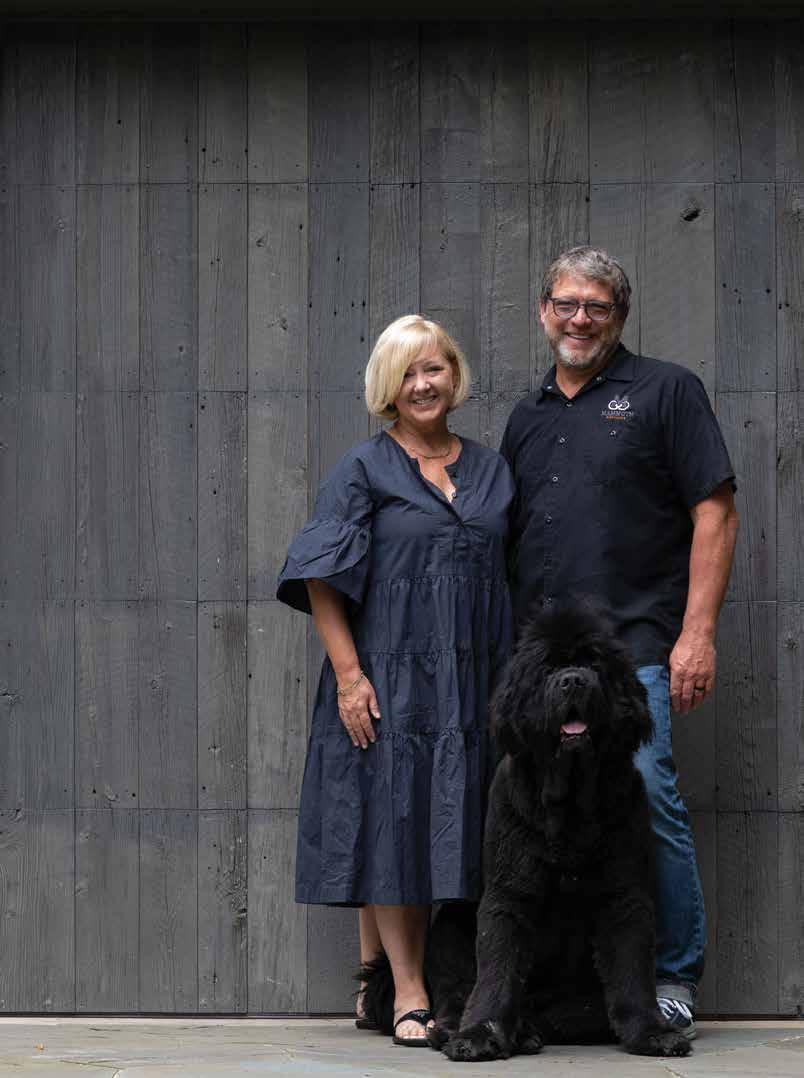
COUNTRY LINES Alger Delta Cooperative Electric Association September/October 2022 MICHIGAN A Story 100 Years In The Making With Mammoth Distilling Honoring Veteran Henry “Chip” Cipolla Password Tips Holiday Side Dishes

You may not realize it, but your home is sitting on a free and renewable supply of energy. A WaterFurnace geothermal comfort system taps into the stored solar energy in your own backyard to provide savings of up to 70% on heating, cooling, and hot water. That’s money in the bank and a smart investment in your family’s comfort. Contact your local WaterFurnace dealer today to learn how to tap into your buried treasure. WATERFURNACE UNITS QUALIFY FOR A 30% FEDERAL TAX CREDIT THROUGH 2032 YOUR LOCAL WATERFURNACE DEALERS THERE’S A TREASURE IN YOUR BACKYARD visit us at waterfurnace.com WaterFurnace is a registered trademark of WaterFurnace International, Inc. Allendale Allendale Htg & Clg (800) 327-1937 allendaleheating.com Bad Axe/Ubly Cutting Edge Htg & Clg (989) 551-0986 Berrien Springs Waterfurnace Michiana (269) 473-5667 gogreenmichgeo thermal.com Big Rapids Stratz Htg & Clg, Inc. (231) 796-3717 stratzgeocomfort.com Clifford Orton Refrig & Htg (989) 761-7691 sanduskygeothermal.com Hart Adams Htg & Clg (231) 873-2665 adamsheating cooling.com Indian River M&M Plmb & Htg (231) 238-7201 mm-plumbing.com Lansing Candor Mechanical (517) 920-0890 candormechanical.com Mancelona Top Notch Htg, Clg, & Geothermal (231) 350-8052 Topnotchheatandair.com Michigan Center Comfort 1/Air Serv of Southern Michigan (517) 764-1500 airserv.com/southernmichigan/ Mt Pleasant Walton Htg & Clg (989) 772-4822 waltonheating.com Muskegon Adams Htg & Clg (231) 873-2665 adamsheatingcooling.com Portland ESI Htg & Clg (517) 647-6906 esiheating.com Sunfield Mark Woodman Plmb & Htg (517) 886-1138 mwphonline.com Traverse City D&W Mechanical (231) 941-1251 dwmechanical.com Geofurnace Htg & Clg (231) 943-1000 geofurnace.com
EXECUTIVE
Christine
Karreen Bird
RECIPE EDITOR: Christin McKamey
COPY EDITOR: Yvette Pecha
CONTRIBUTING EDITOR: Emily Haines Lloyd
PUBLISHER: Michigan Electric Cooperative Association
Michigan Country Lines, USPS-591-710, is published monthly, except August and December, with periodicals postage paid at Lansing, Mich., and additional offices. It is the official publication of the Michigan Electric Cooperative Association, 201 Townsend St., Suite 900, Lansing, MI 48933.
Subscriptions are authorized for members of Alger Delta, Cherryland, Great Lakes, HomeWorks Tri-County, Midwest Energy & Communications, Ontonagon, Presque Isle, and Thumb electric cooperatives by their boards of directors.
Postmaster: Send all UAA to CFS.
Association Officers: Tom Sobeck, Presque Isle Electric & Gas Co-op, chairman; Gabe Schneider, Cherryland Electric Cooperative, vice chairman; Chris O’Neill , HomeWorks Tri-County Cooperative, secretary-treasurer; Craig Borr , president and CEO.
CONTACT US/LETTERS TO EDITOR: Michigan Country Lines 201 Townsend St., Suite 900 Lansing, MI 48933
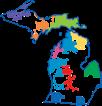
248-534-7358

editor@countrylines.com

CHANGE
Statement of Ownership, Management and Circulation
by U.S.C.
Country
address of office of publication: Michigan Electric Cooperative Association, 201 Townsend St., Ste. 900, Lansing,
On
ASSISTANCE
IN
Contest
Michigan’s Electric Cooperatives November/December 2022 Vol. 42, No. 10 /michigancountrylines /michigancountrylinescountrylines.com
the Cover: Owners of Mammoth Distilling Chad Munger, wife Tracy Hickman, and their distillery dog Dawson. Photo courtesy of Sandra Wong 6 ENERGY
PROGRAMS FOR 2022-2023 10 MI CO-OP KITCHEN Holiday Side Dishes: The perfect pairings for your festive feast. 14 100 YEARS
THE MAKING The rediscovery of Michigan Rosen rye took equal parts of serendipity, location, teamwork and passion. 18 GUEST COLUMN The Salted Christmas Goose: A HomeWorks member recalls how a cooking catastrophe created better family communication. #micoopcommunity Instagram contest winner Flowers give this old Ford a facelift @lexannrebecca (LexAnn DeWeerd) MI Co-op Community To enter contests, submit reader content & more, visit countrylines.com/community Guest Column See details on page 18. Win $150 for stories published! Recipe Contest See details on page 10. Win a $50 bill credit! Instagram
Use #micoopcommunity for a chance to be featured here and on our Instagram account.
OF ADDRESS: Please notify your electric cooperative. See page 4 for contact information. The appearance of advertising does not constitute an endorsement of the products or services advertised.
EDITOR: Casey Clark EDITOR:
Dorr GRAPHIC DESIGNER:
(Required
3685) 1. Publication: Michigan
Lines. 2. Publication No.: 591-710. 3. Filing date: 10/1/22. 4. Issue frequency: monthly, except Aug. and Dec. 5. No. of issues published annually: 10. 6. Complete mailing
MI 48933. 7. Complete mailing address of headquarters of publisher: 201 Townsend St., Ste. 900, Lansing, MI 48933. 8. Full names and complete mailing address of publisher, editors, and executive editor: Craig Borr, Christine Dorr, Casey Clark, 201 Townsend St., Ste. 900, Lansing, MI 48933. 9. Owner: Michigan Electric Cooperative Assoc., 201 Townsend St., Ste. 900, Lansing, MI 48933. 10. Known bondholders, mortgagees, and other security holders owning or holding 1% or more of total amount of bonds, mortgages, or other securities: None. 11. Tax status: has not been changed. 12. Issue date for circulation data: Sept. 2022. 13. Extent and nature of circulation: A) Total No. of copies 245,503 246,919 B) Paid and requested circulation 244,543 246,070 C) Total paid and requested circulation 244,543 246,070 D) 1) Free distribution by mail 157 157 2) Free distribution outside mail 809 849 E) Total free distribution 966 1,006 F) Total distribution 246,469 247,925 G) Copies not distributed 0 0 H) Total 246,469 247,925 I) Percent paid and/or requested circ 98.7 99.7% Avg # of copies each issue during preceding 12 mo. Actual # of copies of single issues published nearest to filing date 16. Publication of statement of ownership: November 2022 17. Signature and title of editor: Christine Dorr, editor Contents 3MICHIGAN COUNTRY LINES
BOARD OF DIRECTORS
District 1—Big Bay
Darryl Small
906-345-9369
• smallwld14@gmail.com
District 2—Harvey/Deerton
Karen Alholm
906-249-1095
• karenalholm@gmail.com
District 3—Grand Marais
Mike Lawless
906-494-2080
• mclawless79@gmail.com
District 4—Cedar River/Palestine Dave Prestin 906-424-0055 • cedarriverplaza@gmail.com
District 5—Gourley/LaBranche/Cornell
Steve Wery
906-639-2812 • addirector5@icloud.com
District 6—Nathan/White Rapids
Jesse Betters
715-923-4946 • jjbetters@gmail.com
District 7—Stonington/Rapid River
Kirk Bruno
906-399-1432 • kbruno.algerdelta@gmail.com
District 8—Nahma/Isabella Don Johnson 906 280-0867
dsj731@gmail.com
District 9—Hiawatha/Maple Ridge Doug Bovin 906-573-2379

dorobo22@icloud.com
GENERAL MANAGER: Mike Furmanski mfurmanski@algerdelta.com

N.
Energy Rates
By Mike Furmanski, General Manager
arly in 2022, I wrote in this column about our rising power costs and the possible rate increases that may be coming. As we looked into the issue of power costs, it became clear that two issues needed to be addressed. The first issue was how costs should be allocated to the members. The second issue was the rising costs of power.
Alger Delta is a member of WPPI Energy, a Wisconsin-based Joint Action Agency. One of the functions of WPPI Energy is that they provide us with wholesale energy. They also perform other services for their members. We asked WPPI Energy to perform a Cost-of-Service Study for us last fall. That study showed that we were not charging nearly enough for our service charge. If we raised the service charge, we could reduce the energy charge. The result would be revenue-neutral for the co-op. As of July 1, 2022, some changes were made, which raised the service charge from $25 per meter per month to $35 per meter per month while also dropping the energy charge from $0.149/kWh to $0.133/kWh for residential members. The study said the actual service charge should be $55 per meter per month. While the overall effect on Alger Delta was expected to be revenueneutral, individual members would see varying results based on usage. Therefore, it was decided that these recommended changes would be implemented gradually.
The second issue was the rising cost of power. We had two choices in how to deal with these rising costs—we could raise rates across the board or implement a Power Supply Cost Recovery (PSCR). Being that the PSCR would be reflective of our actual wholesale costs, that is the route that was chosen. The PSCR can be positive or negative, all based on the wholesale costs we are billed.
906-428-3840
admin@algerdelta.com algerdelta.com
These two changes have helped the bottom line here, but those changes are not enough to keep up with the rising costs of everything the co-op needs to function. Material costs, fuel costs, and vehicle costs are but a few examples of things that cost us more and more every day. The rate restructuring was revenue-neutral, so that is not contributing anything additional to our bottom line. The PSCR is helping to pay for the large increases we see in wholesale power. But we do not have anything in place to account for the large increases we see elsewhere in the operation. These rising costs are a big reason we did not retire capital credits this year—we simply did not have the cash to pay out over $500,000 in capital credits.
I realize that nobody enjoys discussing the possibility of a rate increase, but I think we are at the point where we have no choice. We have to collect adequate revenue to satisfy our lenders’ requirements and have a reasonable margin. Rates have not been increased here at Alger Delta since 2010, and with all of our costs going up, it is time to look seriously at increases.
•
•
HEADQUARTERS: 426
9th St, Gladstone, MI 49837 906-428-4141 • 800-562-0950 Fax:
•
OFFICE HOURS Monday–Friday 8 a.m.–4 p.m. (EST) Alger Delta Cooperative is an equal opportunity provider and employer. /algerdeltaelectric algerdelta.com E
1 2 9 7 5 4 6 8 3 Energy Efficiency Tip of the Month Blocked air vents force your heating system to work harder than necessary and increase pressure in the ductwork, which can cause cracks and leaks to form. Make sure all air vents are unobstructed from furniture, drapes or other items to ensure sufficient circulation throughout your home. If necessary, purchase a vent extender, which can be placed over a vent to redirect air flow from underneath furniture. Source: energy.gov 4 NOVEMBER/DECEMBER 2022
Operations Manager Tiernan Completes CLCP
Troy Tiernan, Alger Delta operations manager, recently completed the requirements to become a credentialed Certified Loss Control Professional (CLCP). The CLCP program is a series of four one-week seminars designed to give attendees the knowledge and skills to manage challenging safety and loss control issues successfully. Subjects include environmental issues, disaster recovery, emergency procedures, and workplace violence, preparing attendees to take preventative measures and corrective action. To complete the certification, attendees must complete an individual project reviewed by a certification panel and attend a 30-hour OSHA compliance course.
The program’s purpose is to provide an educational foundation for safety professionals, giving them the information and tools needed to be influential leaders in the safety function of their organization. The CLCP credential is a benchmark of competency and commitment to safety in the industry. Becoming a CLCP merits recognition by fellow safety professionals and the electrical industry. Congratulations, Troy!
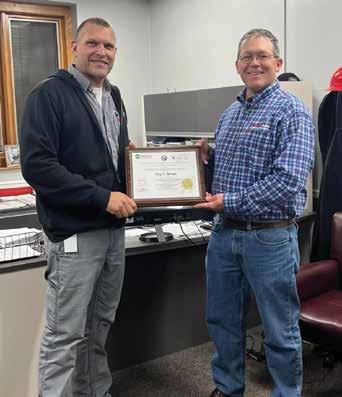
Meet Your New Employee
Alger Delta Cooperative Electric Association recently welcomed Rapid River native Justin Gieszer to the co-op as its newest lineman. Gieszer, 34, graduated from Northern Michigan University’s Electrical Line Technician program in 2009. When asked what drew him to this career, he had a succinct answer. “Job security and thrills,” he said with a laugh. “I love heights, and I love to climb.” After graduating, he began working for independent contractors throughout the United States, but his desire to be closer to home and family brought him back to Delta County. As he put it, “I’ve been traveling for over a decade, and it was getting old.”
Gieszer began work at the co-op on Sept. 26, but was no stranger to the employees or region. “I’ve worked off and on in Alger’s service territory for the past eight years doing contract work, so I already knew almost everyone here,” he said. “I’ve worked hand in hand with many of the employees during storms.”
Gieszer and his wife Rachel are parents to 1-year-old Arlo and reside in Rapid River. In his spare time, Justin enjoys hunting, fishing, and riding dirt bikes competitively. “In the wintertime, I race on ice, and I do flat track in the summer,” he said.

Operations Manager Troy Tiernan is excited to have Justin on board. “Justin is a great fit for the Alger Delta team. He has considerable experience and is already familiar with our service territory,” he said.
 Troy Tiernan (left) is presented the CLCP certificate by Mike Furmanski, Alger Delta general manager.
Troy Tiernan (left) is presented the CLCP certificate by Mike Furmanski, Alger Delta general manager.
5MICHIGAN COUNTRY LINES
Energy
Winter Protection Plan
Contact: Your Local Utility Company
#
The Winter Protection Plan (WPP) protects enrolled seniors and low-income customers from service shut-offs and high utility bill payments during the winter months. If you are eligible, your utility service will remain on (or restored with the WPP) from Nov. 1 through March 31, if you:
• pay at least 7% of your estimated annual bill each month, and
• make equal monthly payments between the date you apply and the start of the next heating season on any past-due bills.
When the protection period ends (March 31), you must begin to pay the full monthly bill, plus part of the amount you owe from the winter months when you did not pay the full bill. Participation does not relieve customers from the responsibility of paying for electricity and natural gas usage, but does prevent shut-off during winter months. You qualify for the plan if you meet at least one of the following requirements:
• are age 65 or older,
• receive Dept. of Health and Human Services cash assistance, including SSI,
receive Food Assistance,
receive Medicaid, or
• household income is at or below the 150% of poverty level shown in the Income Guidelines chart above.
Senior citizen customers who participate in the WPP are not required to make specific payments to ensure that their service will not be shut off between Nov. 1 and March 31. Service for seniors can be restored without any payments.
Note: All customers 65+ are eligible regardless of income. Customers are responsible for all electricity and natural gas used. At the end of the protection period, participants must make arrangements with their utility company to pay off any money owed before the next heating season.
Earned Income Credit
Contact:
• U.S. Treasury Dept., Internal Revenue Service, irs.gov/EITC
• Michigan Dept. of Treasury, michigan.gov/treasury
The Earned Income Tax Credit (EITC) is a refundable federal income tax credit for lowincome working individuals and families who meet certain requirements and file a tax return. Those who qualify will owe less in taxes and may get a refund. Even a person who does not generally owe income tax may qualify for the EITC, but must file a tax return to do so. If married, you must file jointly to qualify. File Form 1040 or 1040A and attach the EITC.
You may claim a Michigan earned income tax credit for tax year 2021 equal to a percentage of the federal earned income tax credit for which you are eligible.
State Emergency Relief Program (SER)
Contact: Local Michigan Dept. of Health and Human Services
michigan.gov/mdhhs
You do not have to be a DHHS client to apply for help with a past-due bill, shut-off
or the need for deliverable fuel through the SER. This program, available Nov. 1–May 31, provides most of its utility assistance during this crisis season. However, limited assistance is available outside the crisis season.
you receive a DHHS cash grant, you may use part of it toward heat and electric bills. Apply online using MI Bridges: Michigan.gov/mibridges.
Low-Income Weatherization Assistance Program
Contact: Local Community Action Agency
You may be able to receive help with weatherizing your home to reduce energy use if you meet low-income eligibility guidelines (200% of poverty guidelines) or if you participate in the Dept. of Health and Human Services Family Independence Program or receive SSI. Weatherization may include caulking, weatherstripping, and insulation. Contact your local Community Action Agency for details. Visit mcaaa.org to find one in your area.
United Way
Contact: Call 2-1-1 or UWmich.org/2-1-1
2-1-1 is a free phone service operating 24 hours daily to provide information about help that may be available in a particular area with utilities and other needs. Dial 2-1-1 or visit mi211.org to find available services.
Medical Emergency Protection
Contact: Local Utility Company
You are protected from service shut-off for nonpayment of your natural gas and/ or electric bill for up to 21 days, possibly extending to 63 days, if you have a proven medical emergency. You must provide written proof from a doctor or a public health or social services official that a medical condition exists. Contact your gas or electric utility for details.
Shut-off Protection For Military Active Duty
Contact: Local Utility Company
or
later than Sept. 30 each year.
must be filed
If you or your spouse has been called into active military duty, you may apply for shut-off protection from your electric or natural gas service for up to 90 days. You may request extensions. You must still pay, but contact your utility company and they will help you set up a payment plan.
Income Guidelines 2022–2023
in Household 150% Poverty Guide Maximum Income 1 $20,385 2 27,465 3 34,545 4 41,625 5 48,705 6 55,785 7 62,865 8 69,945 Add $7,080 for each additional household member.
•
•
Assistance Programs 2022-2023 Season Home Heating Credit Contact: Michigan Dept. of Treasury # Exemp. Max. Income # Exemp. Max. Income 0–1 $14,949 5 $35,717 2 20,141 6 40,909 3 25,333 7 46,101 4 30,525 8 51,293 Add $5,192 for each exemption over 6. You can apply for a Home Heating Credit for the 2022 tax year if you meet the income guidelines listed above (110% of poverty level) or you qualify based on alternate guidelines including household income, exemptions, and heating costs. Additional exemptions are available for seniors, disabled claimants, or claimants with 5% or more of their income from unemployment compensation. If you qualify, you may receive assistance to help pay for your winter heating bills. Forms are available mid-to-late January wherever tax forms are provided or from the Michigan Dept. of Treasury (517-636-4486
michigan.gov/treasury). The Home Heating Credit claim form
with the Michigan Dept. of Treasury no
(DHHS),
notice,
If
6 NOVEMBER/DECEMBER 2022
Michigan Veterans Trust Fund Emergency Grant Program
Contact: MI Veterans Trust Fund
The Trust Fund provides temporary assistance to veterans and their families facing a financial emergency or hardship, including the need for energy assistance. Contact the Michigan Veterans Trust Fund at 800-642-4838 or michiganveterans.com.
Michigan Homeowner Assistance Fund Administering Agency: Michigan State Housing Development Authority
The MIHAF provides funds to customers with assistance preventing homeowner mortgage delinquencies, defaults, foreclosure, loss of utilities or home energy services, and displacement. Applicants must demonstrate financial hardship directly related to COVID-19 on or after Jan. 21, 2020.
MI Energy Assistance Program
Contact: Utility or 2-1-1 in late November
The Michigan Energy Assistance Program (MEAP) includes services that will enable participants to become self-sufficient, including assisting participants in paying their energy bills on time, budgeting for and contributing to their ability to provide for energy expenses, and being energy efficient. Shut-off protection is provided
Nov. 1–April 15 for all residential customers. The MEAP is supported by the state’s Low-Income Energy Assistance Fund (LIEAF). An electric utility that chooses not to collect for the LIEAF shall not shut off service to customers for nonpayment between Nov. 1 and April 15. For a list of electric providers that opt out of collecting the LIEAF, go to michigan.gov/energygrants.
Holiday Tips
The holidays are a magical time, and it’s also the most expensive time of year for many of us. Here are tips to reduce the financial burden with efficient ways to use less energy at home and lower your monthly bills.
Home Practices
If you are hosting guests, your household will consume more electricity than normal. Be prepared with efficiency basics:
• Have your thermostat programmed at 68 degrees when you are home and dialed back by eight to 10 degrees when you leave the house or go to sleep.
• Run the clothes washer on cold with full loads.
• When not in use, turn off lights and the TV; fully shut down computers and gaming systems instead of putting them in sleep or standby mode.
Cooking Efficiency
• Use the oven light to check the food. Every time the oven door is opened, the temperature inside is reduced by up to 25 degrees, according to the Department of Energy (DOE).
• When possible, make use of a slow cooker, microwave, toaster oven, or warming plate, which uses less energy than an oven and stovetop.
• Let hot food cool to room temperature before placing it inside the refrigerator. This ensures you don’t increase the temperature inside your fridge and cause it to use more energy to cool down.
Holiday Lighting
• LED holiday lights consume 70% less energy than conventional incandescent light strands.
• Use light timers so you don’t have to remember to unplug your lights every evening. You can also choose to upgrade to smart holiday lights that offer a wide range of app-controlled options, including time, colors, music, and modes.
Out-of-Town Efficiency
If you’re visiting family and friends during the holidays, prepare your home to use less energy while you’re away.
• Water heating is the second-largest energy expense in your home, accounting for about 18% of your utility bill, according to DOE. Switching your water heater to vacation mode will reduce wasted energy by keeping the water at a lower temperature. If your water heater does not have vacation mode on the dial, you can adjust it to the lowest setting.
• Set your thermostat to around 55 degrees so you’re not wasting energy to heat the home while you’re away.
• Consider upgrading a lamp or fi xture to a smart lightbulb. This allows you to control lights from afar and set a schedule for the light to go on and off.
Dial 2-1-1 for more information on heating and other human services programs.
7MICHIGAN COUNTRY LINES
SNAP SHOT
Christmas Trees

1. Dressed in holiday style. Kim Bourgeois 2. White Christmas. Diane Pomeroy 3. Silent night. Rhea Dever 4. Farmhouse-style Christmas. Paula Knofski 5. Coca-Cola holiday. Connie Tingley 6. Decked. Kim Foos 7. Christmas tree hunting! Sara Kamerschen 8. Country living-sized Christmas tree. Andrew Ledesma 9. Found in the forest. Elizabeth Bates 10. Preschool Christmas tree. Monica Eriksen 11. 14 feet tall with 400 ornaments and 2,000 lights. Kelly Wery



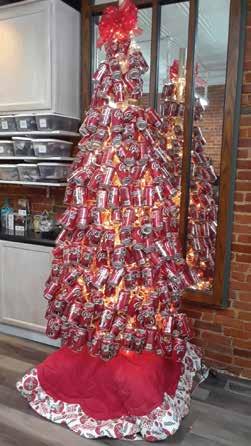

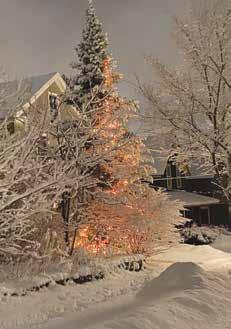
1 2 3 7 6 54 8 NOVEMBER/DECEMBER 2022
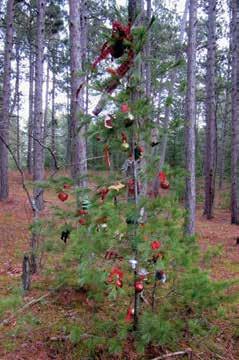



Submit Your Photos & Win A Bill Credit! Alger Delta members whose photos we print in Michigan Country Lines during 2022 will be entered in a drawing. Four lucky members will win a $50 credit on their December 2022 energy bills! Upcoming Photo Topics And Deadlines: Outdoor Adventures, due Nov. 20 (Jan./Feb. 2023 issue) Pets, due Jan. 20 (March/April issue) Bikes, due March 20 (May/June issue) To submit photos, go to http://bit.ly/countrylines. We look forward to seeing your best photos! Submit a photo & win a $50 energy bill credit! 8 10 11 9 Fuel Mix Report The fuel mix characteristics of Alger Delta Co-op Electric Association as required by Public Act 141 of 2000 for the 12-month period ending 6/30/22. Emissions And Waste Comparison *Regional average information was obtained from the MPSC website and is for the 12-month period ending 12/31/21. Alger Delta purchases 100% of its electricity from WPPI Energy, which provided this fuel mix and environmental data. Type of Emission/Waste lbs/MWh Your Co-op Regional Average* Sulfur Dioxide 0.24 7.6 Carbon Dioxide 1,136 2,170 Oxides of Nitrogen 0.46 2.0 High-Level Nuclear Waste 0.0015 0.0083 Comparison Of Fuel Sources Used NOTE: Biomass excludes wood; solid waste incineration includes landfill gas. Fuel source Your co-op’s fuel mix Regional average fuel mix Coal 40.0% 60.4% Oil 0.0% 0.7% Gas 19.3% 8.9% Hydroelectric 1.8% 0.5% Nuclear 20.8% 24.6% Renewable Fuels 6% 4.9% Biofuel 0.0% 0.7% Biomass 0.0% 0.4% Solar 0.3% 0.1% Solid Waste Incineration 0.2% 0.0% Wind 5.5% 3.2% Wood 0.0% 0.5% Regional Average Fuel Mix Your Co-op’s Fuel Mix 9MICHIGAN COUNTRY LINES

Photos by Robert Bruce Photography || Recipes Submitted by MCL Readers and Tested by Recipe Editor Christin McKameyMI CO-OP Recipes TASTY TUSCAN BUTTER MUSHROOMS Deb Finedell, Great Lakes Energy 4 tablespoons butter 2 cloves garlic, minced 1 tablespoon tomato paste 1 pound baby bella mushrooms, cleaned 1 cup cherry tomatoes, halved ¼ cup heavy cream ¼ cup freshly grated Parmesan cheese ¼ teaspoon salt ¼ teaspoon ground black pepper ¹⁄ 8 –¼ teaspoon crushed red pepper flakes 3 cups fresh spinach • chopped fresh basil, for garnish Melt butter in a large skillet over medium heat. Add garlic and tomato paste and cook until fragrant (about 1 minute). Add mushrooms and tomatoes and cook until mushrooms are tender and tomatoes start to burst, about 5 minutes. Add heavy cream and Parmesan, and season with salt, pepper, and crushed red pepper flakes. Bring to a simmer. Add spinach and cook until sauce is thickened and spinach is wilted, stirring occasionally for about 5 minutes. Garnish with basil before serving. Enjoy! Watch a video of this month’s winning recipe at micoopkitchen.com/videos WINNING RECIPE! RECIPE CONTEST National Cherry Month due Dec. 1 • Fish Fry due Jan. 1 • Vegetarian due Feb. 1 Submit your favorite recipe for a chance to win a $50 bill credit and have your recipe featured in Country Lines with a photo and a video. Submit your recipe at micoopkitchen.com, or send it via email (include your full name and co-op) to recipes@countrylines.com. Win a $50 energy bill credit! HOLIDAY SIDE DISHES Serve alongside your holiday dinner. 10 NOVEMBER/DECEMBER 2022
ZUCCHINI CASSEROLE

1 package chicken stuffing
6 cups sliced zucchini
onion
1 (15-ounce) can cream of mushroom soup
1
1
cream
carrots
butter
Preheat oven to 350 F. Prepare chicken stuffing according to package directions.
Fill a saucepan with salted water and bring to a boil. Add sliced zucchini and chopped onion. Boil for 5 minutes; drain well. In a bowl, combine soup and sour cream. Stir in carrots. Fold in drained zucchini and onion. Combine stuffing with butter. Spread ½ of the stuffing mix in bottom of 10x7x2-inch baking pan. Spoon zucchini mixture on top. Sprinkle remaining stuffing on top. Bake for 30 minutes. Serve immediately.

1 head cauliflower
1 stick butter
MASHED CAULIFLOWER

Jane Ellison, Great Lakes Energy
1 (12-ounce) package cream cheese
1 cup shredded cheddar cheese

1 tablespoon horseradish
• salt and pepper, to taste
Cut cauliflower into just bigger than bite size. Steam the cauliflower for 30–35 minutes (do not boil, or it will be mushy). Drain the water from pot. Add all ingredients to the pot. Use a potato masher to mash and combine. Top with additional cheddar cheese and serve.
ROASTED PARMESAN POTATOES
Teresa Peterman, Presque Isle
1½ pounds baby potatoes, halved (20–24 potatoes)
2 tablespoons olive oil
tablespoon melted butter, for drizzling
sprinkle of sea salt
Parmesan Mixture:
cup grated Parmesan (fine texture)
teaspoon garlic powder (or onion powder)
teaspoon dried oregano or thyme
teaspoon paprika
salt
coarse black pepper
Dipping Sauce:
cup sour cream or plain yogurt, or a combination of both
cup finely
Preheat oven to 400 F. Mix all of the ingredients for the “Parmesan Mixture” in a bowl. Drizzle olive oil in 9x13 glass baking dish. Tilt dish to spread all over the base. Use a spoon to scatter the Parmesan Mixture over the base and spread as evenly as you can. Once sprinkled, do not touch or try to spread. Place halved potatoes, cut side down, on top of Parmesan, pressing firmly. Drizzle top of potatoes with melted butter (or spray with butter spray), then sprinkle with salt. Bake potatoes for 35–40 minutes or until they are soft and the Parmesan crust is deep golden (note: you can check through the bottom of the glass). Let rest for 5 minutes. Use a small spatula to cut between every 4–5 potatoes, cutting through the Parmesan crust that binds the potatoes. Serve cheese side up. Mix dipping sauce ingredients together and serve with potatoes (optional). Serves 4–5 people.
Correction: The October version of this recipe did not list zucchini in the ingredients,
standard loaf pans were not included in the instructions, and the frosting has been
to optional. We apologize for the omissions.
CHOCOLATE ZUCCHINI CAKE

Cindy Thome, Alger Delta
Frosting (optional):
cup soft butter
cup soft cream cheese
teaspoon vanilla
sugar
Preheat oven to 325 F. Grease and flour a 9x13 pan or two standard loaf pans. In a large bowl, mix together all cake ingredients until combined. Pour into the pan. Bake for 40–45 minutes. Cool completely before frosting. To make the frosting, in a small bowl, combine all of the frosting ingredients and beat in a mixer for 2 minutes. Frost the cake and enjoy.
Dennis Gocha, Great Lakes Energy
¼ cup chopped
cup sour
cup shredded
½ cup melted
1
•
½
½
½
½
¼ teaspoon
½ teaspoon
¾
¼
chopped green onions or chives
½ cup butter ½ cup vegetable oil 1¾ cup sugar 2 beaten eggs 1 teaspoon vanilla 3 cups shredded zucchini (approx. 3 medium) 2½ cups flour 4 tablespoons cocoa powder ½ teaspoon baking powder 1 teaspoon baking soda ½ teaspoon cinnamon ½ teaspoon ground cloves
½
½
1
3 cups powdered
two
changed
11MICHIGAN COUNTRY LINES
Semper Fi

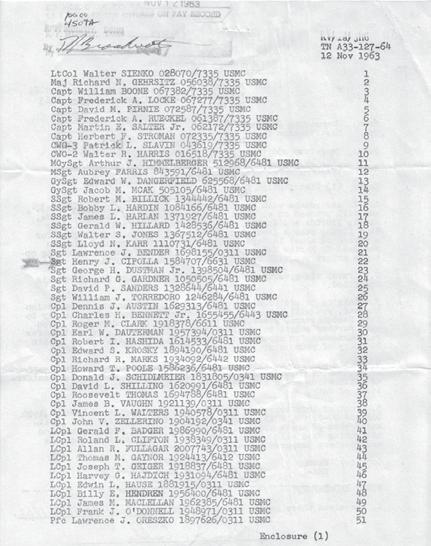 By Yvonne Whitman
By Yvonne Whitman

Growing up in the Italian Federal Hill district of Providence, Rhode Island Escanaba resident Henry “Chip” Cipolla felt that there wasn’t a future for him. “I always wanted to be a Marine,” he said, and after graduating high school in 1955, he enlisted. He received a quick indoctrination of what his life would be like in the military after taking his oath. “Right after the ceremony, they handed me a broom and told me to sweep the floor and get to work,” he recalls with a chuckle. And get to work, he did. Assigned to the Electronic and Electrician School for Aircraft Maintenance, he found his niche, excelled, and sealed his future in avionics.

In 1959, Chip was asked to join the elite Marine Helicopter Squadron One (HMX-1). “It was considered an honor to work on aircraft that the president flew on, so I jumped





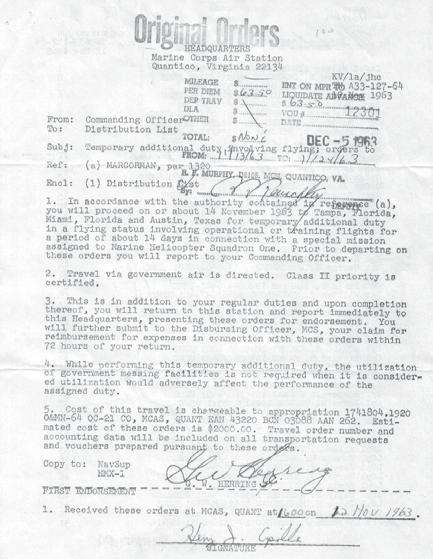 Chip’s orders to fly to Dallas on
Chip’s orders to fly to Dallas on
Nov. 23, 1963
Nov. 11, 2022, is Veteran’s Day, and we honor those who have served our country.
12 NOVEMBER/DECEMBER 2022
at the chance,” he recalls. Based in Quantico, Virginia, HMX-1 is the helicopter squadron directly responsible for the transportation of the president and vice president of the United States, as directed by the Marine Corps and White House Military Office. According to Chip, the term “presidential helicopter” refers to a fleet of helicopters used by the president, not just one. “For security reasons, there are often up to four helicopters in the air in a varied formation. Whichever chopper has the president on board is deemed Marine One for the flight,” he said.
Selection for this elite squadron of approximately 55 Marines involved an extensive background check. Being a firstgeneration Italian American added to the checking; even his neighbors in Federal Hill had been questioned. “It’s a prestigious job, and security is taken very seriously,” he acknowledges. Chip’s knowledge of the Sikorski helicopters used in the HMX-1 fleet garnered him the position of crew chief, making him responsible for helicopter maintenance both on the ground and in flight. “It was a 24-7 job with little room for excuses,” he said.
Chip’s time on HMX-1 included serving Presidents Eisenhower, Johnson, and, most memorably, John F. Kennedy. But the administration, dubbed with the fairy-tale title “Camelot,” came to a tragic ending on Nov. 22, 1963, in Dallas. Earlier that day, Chip and the crew had flown to Love Field Air Base in Dallas to fly the president and the first lady to Johnson’s ranch after the motorcade through Dallas. As they readied the helicopter, they received word that the president had been shot. “Initially, we didn’t believe it,” he said. “Once it was confirmed, we were all on edge as we waited for orders. It wasn’t until the next morning that we were instructed to fly back to Quantico.” Like so many other Americans, he and his fellow crew members viewed Kennedy’s televised funeral a few days later. “We were all in the ‘ready room’ watching it. We may have been tough Marines, but when we saw little John-John saluting, there wasn’t a dry eye in the room,” he said.

Chip’s service in HMX-1 ended 3 months later when he was selected for admission into Officer Candidate school. But his memories of this charismatic president remain vivid. “He was really a nice fellow. He was friendly and always had a good word for everybody regardless of what was happening. He appeared to really enjoy being president,” he said.
On completion of Officer Candidate school, his military service included two tours of duty in Japan and four tours in Vietnam. In 1972, while on leave in Escanaba visiting a Marine Corps buddy, John Bissell, Chip met his future wife, Mary Kay. They were married a year later at the Oceana Naval Air Station in Virginia Beach and will celebrate 50 years together next June.
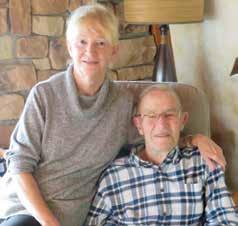

When asked to summarize why she thought Chip’s military life was so meaningful to him, there was only a brief pause. “The military gained an excellent Marine, and he is proud to be a member of the Corps. Being a Marine was a natural fit for him. He liked to “live on the edge,” and the discipline of having a fit mind and body appealed to him. Above all, he knew the value of leadership through example. He was to instill competence and confidence into his crews and squadrons. The commanding officers, pilots and crews respected his judgment, and trusted him with their aircraft and above all with their lives,” she said.

After 23 years of service, the combat veteran, and father of four, decided it was time to retire from the Marines. “I didn’t want to be away from home anymore. I didn’t want another 13-month unaccompanied tour, an overseas move, or duty at the Pentagon. At this point in my life, the peace and quiet of the Upper Peninsula was looking pretty good,” he said.
Chip’s military service earned him many medals, including two bronze stars and three air medals. But for Chip, one medal stands above all the others. “The Presidential Medal for Service in the White House. To me, there was no greater honor than being trusted with the safety and well-being of my commanders in chief and their families,” he said.
13MICHIGAN COUNTRY LINES
A Story 100 Years In The Making
With Mammoth Distilling
By Emily Haines Lloyd
When Chad Munger held just a palmful of Rosen rye seeds in his hand in 2020, it was the beginning, or at least the continuation, of a 100-year-old story.
Munger, the founder and owner of Mammoth Distilling, with its flagship tasting room in Central Lake, and whiskey maker Ari Sussman had first spoken about these valuable seeds a few years earlier when he made a discovery while army-crawling his way through the agriculture and food archives at Michigan State University. He came across a full-page ad for Old Schenley rye in a 1934 issue of Vanity Fair touting that it was made with Michigan Rosen rye: “The most compact and flavorful rye kernels Mother Earth produces were used for this luxurious brand,” it said.
“Ari called me right away,” said Munger. “First, we couldn’t believe this rye had basically existed in our own backyard and we hadn’t heard of it before. And then the wheels started spinning on how to bring this rye back.”
The seeds had been successfully grown just off the Leelanau Peninsula

on South Manitou Island for the first time 100 years ago. With the seeds shipped from Eastern Europe in the early 1900s to Joseph Rosen, they eventually found a home at MSU, where Rosen worked with colleagues to test the flavor. The more the Mammoth team dug into the details, the more amazing the story became. They came to a simple conclusion— this was not your average rye.
“It quickly became coveted by the country’s top whiskey makers,” said Munger. “Unfortunately, it had a fatal flaw—it cross-pollinated very easily and would quickly lose the magical flavor that made it so special.”
Enter South Manitou Island: Being 16 miles from the Michigan coastline and not too far from MSU, it eliminated the danger of immediate cross-pollination. While Rosen rye had a good run supplying whiskey makers for decades, post-Prohibition times brought a hefty hurdle. During those “dry” years, folks had become accustomed to the low price tag of corn-based whiskey.
As the folks at Mammoth kept pulling threads on this unraveling story, they
quickly addressed the obstacles of bringing Rosen rye back, as well as introducing interested parties into the existing story of the strain.
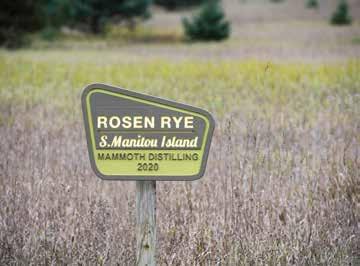
“We didn’t create it, we rediscovered it,” said Munger. “It really felt like we were being charged with keeping the story alive.”
Many amazing groups helped to keep that story alive, from the USDA, to MSU, to the National Park Service
14 NOVEMBER/DECEMBER 2022
(which manages South Manitou Island as part of the Sleeping Bear Dunes National Lakeshore), in order to bring Rosen rye back to Michigan.


The initial crop, just 14 acres, was planted in October 2020, nearly 100 years after the first seeds made their way to Michigan. Eighty years after the last crop of Rosen rye left South Manitou Island, members of the Mammoth team celebrated the first Rosen Rye Day this past August to harvest the grain. The hope is to continue this historical process for years to come.
None of it has been easy. Or even logical. Farming on South Manitou Island comes with its own set of unique obstacles, including no irrigation, no pesticides, a lot of work done by hand, and concerns that the team won’t know for years how the whiskey will taste.
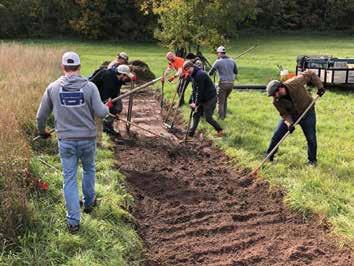
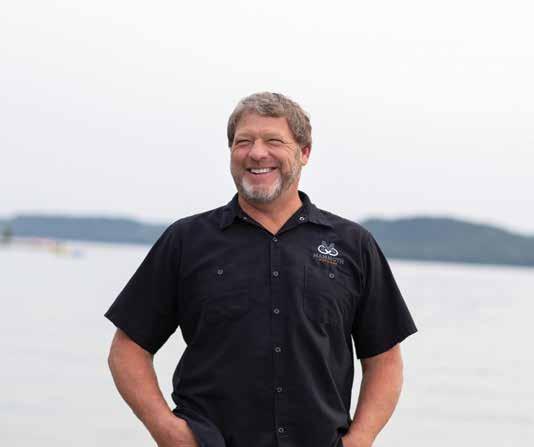
So, why do it? Why spend the time, energy, and, let’s be honest, money on a venture that may never pay off? Munger suggests that the entire team, including those at Michigan State,
the NPS, and the whiskey community at large, all agree—“Because it’s the right thing to do. Bringing the grain back is good for the world.”
If that’s the “why,” Mammoth is certainly slogging their way through the “how.” Watching the research, the passion, the grit, the sweat on the brow, and the vision, it’s not a simple path and it takes more than falling in love with a great story. It takes a leap of faith.
Munger identifi es the simple, but not at all easy, path forward: “All we need to be willing to do is the unreasonable thing.”
Unreasonable or not, there’s an excitement around this agricultural rediscovery and a connection to history, land, and rich storytelling that is at the heart of Mammoth Distilling.
Mammoth Distilling has locations in Adrian, Bay Harbor, Bellaire, Central Lake, and Traverse City.
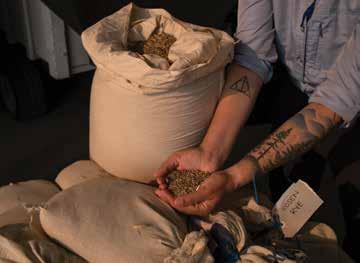
“We didn’t create it, we rediscovered it. It really felt like we were being charged with keeping the story alive.”
CHAD MUNGER—OWNER, MAMMOTH DISTILLING
/mammoth_distilling mammothdistilling.com /MammothDistillingTC 15MICHIGAN COUNTRY LINES
Can I Streamline My Passwords?
Ah, passwords—the internet’s most helpful headache.
No matter how much you want to protect your data, it can be tempting to simplify your ever-growing password collection. But you don’t want to solve one problem only to create new ones.
In the examples below, four people have tried to solve their password overload—let’s see how each one did.
“More passwords, more problems.” That’s the motto of One-and-Done Will.
Will decided using the same password for every account would make it easier to remember his login information. He wouldn’t have to think when making new passwords either.
Hackers and bots are big fans of Will’s method. Once they figure out his password, they can use it to log into every single one of his accounts without breaking a sweat.

Will needs to have a varied set of passwords. Otherwise, his security is one and done too.
Nick the Notetaker has a theory: If all your passwords are written down, you won’t have to worry about memorization, and hackers can’t guess them. Nick writes his passwords in his notebook, which he keeps in a drawer at his desk.
Nick is getting there. There’s one major problem, though—if Nick can read his password off a list, everyone can. Even if he locks his desk drawer, all it takes is a misplaced key to make his passwords freely available.
Quizmaster Kelly likes to use trivia about herself to craft easy-toremember passwords. “423KingStreet” (her address) and “July1963!” (her birth month) are just two of her masterpieces.

Kelly has successfully thwarted the laziest of intruders by switching up her passwords. She still has a problem: If a bot has collected any of her personal data, or if someone she knows is trying to hack her, her passwords are almost as transparent as Will’s. It turns out quizzes aren’t so hard when you already know the answers.
Kelly needs passwords with minimum complexity to keep them from being guessable. That means no common names or dictionary words, and a good mix of some or all of the following: uppercase letters, lowercase letters, numbers, and special characters (for example, a question mark or ampersand).
Hackbuster Helen is on her A game. She knows that using a digital password manager can save her login ID and password for every account she uses without worrying about theft, bots, or memorization. The app keeps her passwords secure behind a two-factor authentication system (it texts or calls to verify it’s her when she logs in). While it’s active, the app fills in her passwords automatically when she visits sites she’s registered for. It even helps her generate new, random passwords.
Some of Helen’s favorite password managers include:
Most password manager apps work with a wide range of devices and browsers, and many offer a free tier that’s enough for the average user.
Other options like iCloud Keychain (for Apple devices) and Google Password Manager (a browser-based wallet) are also good, despite some limitations on how and where you can access them.
As with any new software, you should research the features of each before signing up.


Bitwarden LastPass 1Password Keeper #3 Using Easyto-Remember Words or Personal Info #1 Reusing Passwords #2 Writing Passwords Down #4 Using a Secure Password Manager
Celebrating 78 Years Of Christmas Trees
Alger Delta Electric Cooperative members
Dave and Donna Buechler’s Christmas trees have been a part of the Menominee County community since 1945. Donna’s parents were dairy farmers, but every year, her dad Albert would cut wild trees from the woods and ship them to Chicago to stock his three city tree lots, which sold the trees. At the peak of things, they sent 4,000 Michigan trees to the greater Chicago area to “make the
season brighter” for city residents.
In 1979, they discontinued their dairy operations on the farm, and Albert and his wife Stella began planting trees on their former dairy farm. This provided control over the quality of their product.
With the passing of Donna’s parents, she and her husband took over the Christmas tree business and included it in their venture, Elmcrest Acres, promoting agritourism. Along with



raising market lamb and pork, the farm now consists of a “folk school” with various classes and events and a venue for reunions, birthday parties, and weddings.
But starting in late November, the farm is all about Christmas with tree sales, wreath-making classes, special annual events such as Hot Chocolate with Mrs. Claus, and the annual “Holiday Feast.” “The holiday season here has special meaning for us,” says Donna. “It really is about family roots and traditions. We’ve had people coming to cut trees who came when they were children, and now they are bringing their children here.”
She recalls one especially meaningful tree purchase that occurred in 2020. “It was our 75th anniversary for Christmas tree sales, and we had a prize basket to give the buyer of the 75th tree that year,” she said. “As it turned out, the mother of the lady who won it used to plant trees for my dad. It was a moment. I know my parents would have liked that.”
ElmcrestAcres.com /elmcrestacres For more information on the farm and the “Choose and Cut” tree schedule, visit: 17MICHIGAN COUNTRY LINES
The Salted Christmas Goose
 By Gene Comero, a HomeWorks Tri-County Cooperative member
By Gene Comero, a HomeWorks Tri-County Cooperative member

Violet Comero, in her own words.
On Christmas Day, Ma always got up first and stuffed the Christmas goose. This year was no different. She stuffed the goose and salted it and put it in the oven, and then went to the barn to do her chores. In the meantime, Papa got up and started the stove in the dining room. Before he went to the barn, he checked on the goose. He thought it didn’t look like Ma salted it, so he salted it and went to the barn.
After a while, my oldest sister got up to make breakfast. She checked the goose and thought it didn’t look like it had been salted, so she salted the goose some more. Later in the morning, Grandma Haeuser showed up, and the first thing she does is go to the kitchen to help. Well, she had to check the goose, too. Didn’t look like anyone salted it, so the poor goose got some more salt.
Everything was smelling good, and we could hardly wait. Finally, we sat down to eat. We all had goose, but no one was eating it. Then they started talking about it and realized what they had done. It was bad. It sat in the house till the next day, but nobody would eat it. So Ma threw it outside for the dog. He wouldn’t eat it, nor the cats. It remained around outside all winter. It would get covered with snow, and some animal would smell it and dig it up again, and leave it lying. That poor goose floated around the yard all winter. In spring, someone felt sorry for it and buried it.
There was much more communication in the house (kitchen) after that.
Where In Michigan Is This?
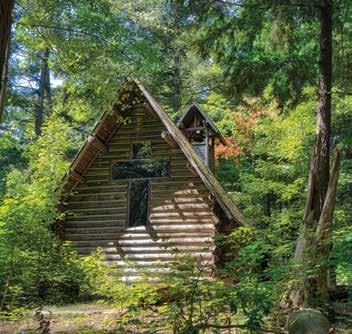
Identify
September 2022 Winner! Our Mystery Photo winner is Nancy Root, a Great Lakes Energy Cooperative member, who correctly identified the photo as Cranbrook Orpheus Fountain on its campus in Bloomfield Hills.
Winners are announced in the following issues of Country Lines: January, March, May, July/August, September, and November/December.

the correct location of the photo to the left by Nov. 20 and be entered into a drawing to win a $50 electric bill credit. Enter your guess at countrylines.com/community.
Guest Column
Share your fondest memories and stories. Win $150 for stories published. Visit countrylines.com/community to submit. Win $150! Win a $50 energy bill credit!
Memories from 1925, from my mother,
TIRED OF BURNING WOOD?

“When I could no longer physically cut 20 cords of wood, I installed a Well-Connect. The system has met all claims and surprised me. If people are heating and cooling with propane, fuel oil, or wood and have their own well, they have a need and don't realize it. That need is to cut those heating & cooling costs by at least half (as well as emissions).”
Jess S., Cherryland Electric Member


HOW DOES THE SYSTEM WORK?
This hybrid approach allows almost any existing well to become a free, clean energy source for heating and cooling your home. A Well-Connect can be installed in one day, any time of the year, as a DIY or professionally.

CALL FOR A FREE HOME VISIT wellconnectgeo.com989-356-2113
Hybr d Geotherma EXISTING FURNACE 50° WATER 38° WATER 95° AIR 70° AIR Geothermal Made Affordable ELIGIBLE FOR UP TO $2,000 REBATE & 30% TAX CREDIT Michigan-Made Hybrid Geothermal System Provides Savings & Comfort
Quick Tips To Avoid High Winter Bills
Looking to lower your bills this winter?
Seal air leaks and insulate well to prevent heat from escaping and cold air from entering your home.

Reduce waste heat by installing a programmable thermostat.
Turn off lights when not in use. Lower your water heater temperature. The Department of Energy recommends using the warm setting (120 degrees) during fall and winter months.
Unplug electronics like kitchen appliances and TVs when you’re away.
Open blinds and curtains during the day to allow sunlight in to warm your home.
Close blinds and curtains at night to keep cold, drafty air out.
Use power strips for multiple appliances, and turn off the main switch when you’re away from home. Wash clothes in cold water, and use cold-water detergent whenever possible. Replace incandescent light bulbs with LEDs, which use at least 75% less energy.
800-562-0950/algerdeltaelectric
10
Use the 10 tips below to conserve energy. 1 2 3 4 5 6 7 8 9 10










 Troy Tiernan (left) is presented the CLCP certificate by Mike Furmanski, Alger Delta general manager.
Troy Tiernan (left) is presented the CLCP certificate by Mike Furmanski, Alger Delta general manager.

















 By Yvonne Whitman
By Yvonne Whitman







 Chip’s orders to fly to Dallas on
Chip’s orders to fly to Dallas on
















 By Gene Comero, a HomeWorks Tri-County Cooperative member
By Gene Comero, a HomeWorks Tri-County Cooperative member







